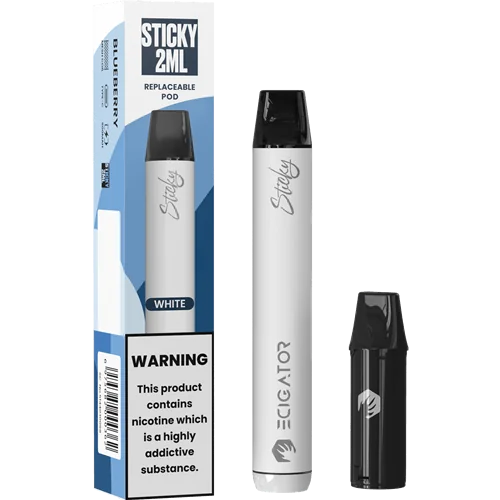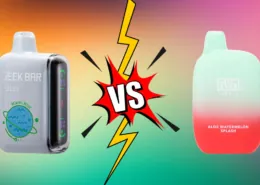The Impact of CBD Vape on Lung Health – Does it Affect Lungs?
As the popularity of CBD vaping continues to rise, it’s crucial to delve into the intricacies of how this consumption method can impact lung health. With products like Ecigator disposable vapes gaining traction, many individuals are turning to CBD vaping as a means to experience potential benefits such as relief from pain, anxiety, and inflammation. However, amidst the growing interest in CBD vaping, it’s essential to approach this topic with a critical eye, examining the latest research and expert insights to gain a comprehensive understanding of the potential benefits and risks involved.
In this in-depth guide, we’ll explore the multifaceted relationship between CBD vaping and lung health, comparing vaping to other forms of CBD administration, assessing the risks associated with additives and contaminants, and delving into the science behind CBD’s interaction with lung diseases. By providing a balanced and well-researched perspective, we aim to empower readers with the knowledge necessary to make informed decisions about their health and well-being.
The Endocannabinoid System: A Key Player in CBD’s Effects
To grasp the potential impact of CBD vaping on lung health, it’s essential to understand the role of the endocannabinoid system (ECS) in the body. The ECS is a complex network of receptors, enzymes, and endocannabinoids that plays a crucial role in maintaining homeostasis and regulating various physiological processes, including inflammation, pain sensation, and immune function (Zou & Kumar, 2018).
When inhaled through vaping, CBD enters the lungs and is rapidly absorbed into the bloodstream, where it interacts with the ECS. This interaction is believed to be responsible for many of CBD’s potential therapeutic effects, such as its anti-inflammatory and analgesic properties (Bruni et al., 2018). However, the method of administration—in this case, vaping—introduces additional variables that can impact lung health, making it essential to weigh the potential benefits against the risks, particularly for individuals with pre-existing lung conditions.
Vaping vs. Other Forms of CBD Administration: A Comparative Analysis
When considering CBD for symptom relief, it’s important to compare the pros and cons of vaping against other methods of administration, such as oral consumption or topical application. Vaping CBD offers several advantages, including rapid absorption and onset of effects, precise dosage control, and higher bioavailability compared to oral administration (Millar et al., 2018). These factors can be particularly appealing for individuals seeking quick relief from symptoms like pain or anxiety.
However, vaping also poses potential risks to lung health that should not be overlooked. Inhaling substances directly into the lungs can cause irritation and inflammation, especially if the vape solution contains additives or contaminants (Traboulsi et al., 2020). While vaping may be considered a cleaner alternative to smoking, with fewer toxins and carcinogens, it still carries the risk of lung damage, particularly with prolonged use (Gotts et al., 2019).
In contrast, oral consumption of CBD, such as through capsules or edibles, offers a more gradual and sustained release of CBD into the body, albeit with lower bioavailability due to first-pass metabolism (Huestis, 2007). Topical application of CBD, such as through creams or lotions, allows for localized relief without the potential risks associated with inhalation, but may not provide systemic effects (Hammell et al., 2016).
Ultimately, the choice between vaping and other forms of CBD administration should be based on individual needs, preferences, and health status, taking into account the potential benefits and risks associated with each method.

Ecigator Sticky Open Pod Kit
The Sticky Open Pod Kit is a contemporary vaping device that combines functionality with fashion. This kit is designed with a box-style form factor, offering a compact and stylish appearance that’s ideal for vaping enthusiasts on the move.
At the heart of this kit is a Refillable Open Pod System, with a capacity of 2ml, perfect for accommodating a variety of e-liquids. The pod is equipped with a high-quality Mesh Coil that not only ensures a rich and flavorful vaping experience but also boasts durability for up to 8 Refills.
The Unregulated CBD Market: Navigating the Risks
One of the most significant concerns surrounding CBD vaping is the lack of regulation in the market, particularly when it comes to vaping products. The CBD industry has experienced rapid growth in recent years, but the absence of strict regulatory oversight has led to a proliferation of low-quality and potentially dangerous products (Bonn-Miller et al., 2017).
Vape solutions may contain harmful additives, such as propylene glycol or vitamin E acetate, which can cause lung irritation and injury when inhaled (Blount et al., 2020). Additionally, contaminants like heavy metals, pesticides, and residual solvents may be present in poorly manufactured CBD vape products, posing further risks to lung health (Alzghari et al., 2017).
To minimize the risk of exposure to harmful substances, it’s crucial to exercise caution and thoroughly research CBD products before making a purchase. Look for products that have been third-party tested and have clear labeling of ingredients and CBD content. Reputable manufacturers should provide certificates of analysis (COAs) that verify the purity and potency of their products.
Furthermore, it’s essential to stay informed about the latest developments in CBD regulation and safety. The U.S. Food and Drug Administration (FDA) has been working towards establishing a regulatory framework for CBD products, including vaping devices and e-liquids (FDA, 2020). As more research emerges and regulations evolve, consumers should remain vigilant and adapt their choices accordingly.
CBD and Lung Diseases: Exploring the Potential Benefits and Risks
For individuals with lung diseases, the decision to use CBD vape products requires careful consideration of the potential benefits and risks involved. CBD has been studied for its potential therapeutic effects in various lung conditions, such as asthma, chronic obstructive pulmonary disease (COPD), and lung cancer (Lim et al., 2020). Its anti-inflammatory and immunomodulatory properties have been suggested to play a role in alleviating symptoms and modulating disease progression (Casanova et al., 2017).
However, the specific impact of vaping CBD on lung health in individuals with pre-existing conditions remains understudied. While vaping CBD may offer rapid symptom relief and precise dosage control, the act of inhaling substances into already compromised lungs can potentially exacerbate inflammation and irritation (Duffy & Li, 2020). The presence of additives or contaminants in vape solutions may further aggravate lung issues, making it essential to choose high-quality, lab-tested products from reputable sources.
Moreover, the long-term effects of CBD vaping on lung health are not yet fully understood, particularly in the context of chronic lung diseases. More research is needed to elucidate the mechanisms by which CBD interacts with the lungs and to establish the safety and efficacy of vaping as a delivery method for individuals with lung conditions (Marsden et al., 2019).

The Science Behind CBD’s Interaction with Lung Diseases
CBD’s potential benefits for lung health are rooted in its interaction with the body’s endocannabinoid system and its ability to modulate inflammation and immune responses. When inhaled through vaping, CBD enters the lungs and is quickly absorbed into the bloodstream, where it can interact with receptors involved in regulating various physiological processes (Mechoulam et al., 2007).
Studies have suggested that CBD may exert anti-inflammatory effects in the lungs by modulating the production of pro-inflammatory cytokines and reducing oxidative stress (Ribeiro et al., 2012). Additionally, CBD has been shown to influence the expression of certain receptors, such as PPAR gamma, which are involved in its potential anti-inflammatory and tumor-regressive action in lung diseases (Ramer et al., 2012).
However, it’s important to note that much of the research on CBD and lung health has been conducted using animal models or in vitro studies, and the specific effects of vaping CBD on human lung health are less well-established (Esposito et al., 2020). While these preclinical findings are promising, more human clinical trials are needed to fully understand the mechanisms by which CBD interacts with lung diseases and to determine the efficacy and safety of vaping as a delivery method.
Clinical Perspectives and Patient Experiences
Healthcare providers play a crucial role in guiding patients who are considering the use of CBD vape products for lung health. They emphasize the importance of individualized care and caution against a one-size-fits-all approach, particularly in light of the recent respiratory illness outbreaks linked to vaping (Layden et al., 2019).
While some patients report immediate relief from symptoms and appreciate the ease of dosage control with vaping, healthcare professionals stress the need to weigh the potential benefits against the risks, such as lung irritation and exposure to harmful additives (Ong, 2019). They advocate for a patient-centered approach that takes into account individual health status, preferences, and goals, and emphasize the importance of ongoing monitoring and adjustments as needed.
Patient testimonials offer valuable insights into the lived experiences of individuals who have used CBD vape products for lung health. Some report significant improvements in symptoms such as shortness of breath, cough, and chest pain, while others describe mixed results or adverse effects (Fedorova et al., 2019). It’s crucial to approach these anecdotal accounts with a critical eye, recognizing that individual experiences may vary and do not necessarily represent scientific evidence.
The mixed public perception of vaping, including concerns from medical experts about its impact on physical and mental health, highlights the need for a nuanced and evidence-based approach to CBD vaping and lung health (Dinardo & Rome, 2019). As more research emerges and regulatory frameworks evolve, it’s essential for healthcare providers and patients to stay informed and adapt their practices accordingly.
Navigating the Use of CBD Vape for Lung Health: Practical Considerations
For individuals who are considering using CBD vape products for lung health, several practical considerations should be taken into account to maximize potential benefits and minimize risks.
Choosing the Right CBD Products
Selecting high-quality, lab-tested CBD vape products is crucial, particularly for those with pre-existing lung conditions. Look for products that have clear labeling of ingredients and CBD content, and avoid those with unknown additives or thinning agents that could potentially harm lung health (Poklis et al., 2019). Reputable manufacturers should provide certificates of analysis (COAs) that verify the purity and potency of their products.
Dosage and Titration
Starting with a low dose and gradually increasing as needed is a prudent approach when beginning CBD vaping for lung health. This allows individuals to assess their body’s response and find the optimal dosage for their specific needs (Millar et al., 2019). It’s essential to monitor symptoms and adjust the dosage accordingly, in consultation with a healthcare provider.
Legal and Regulatory Considerations
The legal status of CBD varies by jurisdiction, and the regulatory landscape surrounding CBD vape products can be complex (Mead, 2019). It’s important to stay informed about local laws and regulations, as well as any updates from national and international health authorities. When traveling, be aware that laws regarding CBD possession and use may differ between regions.
Consultation with Healthcare Providers
Before starting any new treatment, including CBD vaping for lung health, it’s crucial to consult with a healthcare provider. They can offer personalized guidance based on individual health status, medications, and treatment goals, and help monitor progress and adjust the approach as needed (VanDolah et al., 2019). Open and honest communication with healthcare providers is essential for ensuring the safest and most effective use of CBD vape products.

Ecigator Sticky Prefilled Pod Kit
The Ecigator Sticky Prefiiled Replaceable Vape Pod Kit is new kind of vape kit which the prefilled disposable pod can be changed.
That means you don’t need to throw away the whole kit but just change another pod. Also you can change the pods to taste different flavors.
The Future of CBD Vaping and Lung Health Research
As the popularity of CBD vaping continues to grow, so does the need for rigorous scientific research to better understand its impact on lung health. While preclinical studies and patient anecdotes offer promising insights, more human clinical trials are necessary to establish the efficacy and safety of CBD vaping for various lung conditions (Esposito et al., 2020).
Future research should focus on elucidating the mechanisms by which CBD interacts with the lungs, both in healthy individuals and those with pre-existing conditions. This includes investigating the potential anti-inflammatory and immunomodulatory effects of CBD, as well as its influence on specific receptors and signaling pathways involved in lung health (Vibholm et al., 2019).
Additionally, studies comparing the effects of different CBD administration methods, such as vaping, oral consumption, and topical application, can help identify the most appropriate delivery routes for specific lung health goals (Millar et al., 2018). Long-term studies are also needed to assess the safety and potential adverse effects of chronic CBD vaping, particularly in the context of lung diseases (Lim & Chye, 2021).
As the regulatory landscape evolves, it’s essential for researchers, healthcare providers, and policymakers to collaborate in establishing evidence-based guidelines for the use of CBD vape products. This includes setting standards for product quality, safety, and labeling, as well as providing education and resources for consumers to make informed decisions about their health (Mathur & Danbolt, 2020).
Conclusion
The relationship between CBD vaping and lung health is complex and multifaceted, with potential benefits and risks that require careful consideration. While CBD’s interaction with the endocannabinoid system and its anti-inflammatory properties may offer therapeutic potential for lung conditions, the act of vaping itself can introduce additional variables that may impact lung health.
Navigating the unregulated CBD market and selecting high-quality, lab-tested products is crucial for minimizing the risk of exposure to harmful additives and contaminants. Healthcare providers play a vital role in guiding patients who are considering CBD vaping for lung health, emphasizing the importance of individualized care and ongoing monitoring.
As research continues to evolve, it’s essential for individuals to stay informed about the latest scientific findings and regulatory developments surrounding CBD vaping and lung health. By approaching this topic with a critical eye and a commitment to evidence-based decision-making, we can work towards harnessing the potential benefits of CBD while prioritizing the safety and well-being of those who use it.
- Minneapolis Sets $25 Minimum Price for E-Cigarettes - July 11, 2025
- Alabama Schools to Implement New Anti-Vaping Policies - July 11, 2025
- Is Vaping and Driving Illegal in Rhode Island? (2025 Guide) - July 10, 2025








